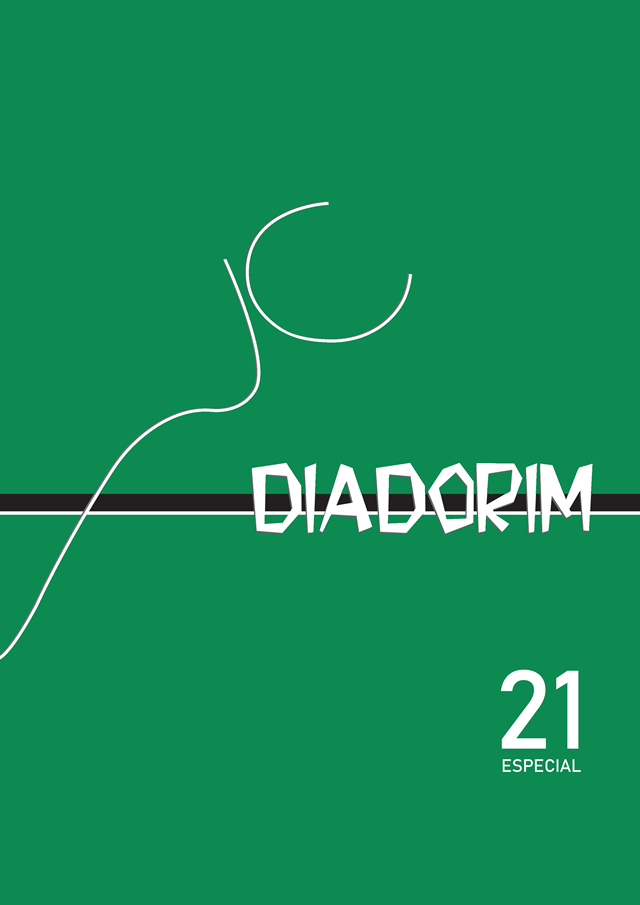Towards a cosmopolitan historical memory? Transnationalisation and emotions in contemporary female galician authors
DOI:
https://doi.org/10.35520/diadorim.2019.v21nEspa27413Palabras clave:
Memory, Emotions, Female Galician Writers, Transnationalization, Holocaust.Resumen
This article analyses the contribution of female Galician writers to the transnationalisation of the common European memory of uncomfortable pasts, and how their main approach to it is through the use of emotional strategies. Following an overview of the field, this study focuses on two works by Rosa Aneiros and Inma López Silva, respectively. The aim of this study is to valorise the contribution of women writers which has helped to avoid the risk of the overexploitation of the subject-matter of the Spanish Civil War while showing the moral and political potential of such novels, this yet to be fully explored.
Descargas
Citas
BECK, Ulrich (2006) The Cosmopolitan Vision. Cambridge, Polity Press. p. 17-31.
BUESCU, Helena (2015) “Europe between Old and New: Cosmopolitanismo Reconsidered”. In: César Domínguez & Theo D’Haen (eds.) Cosmopolitanism and the Postnational. Literature and the New Europe. Brill/Rodopi, Leiden/Boston: 1-26
COLLIN, Françoise (1995) “Historia y memoria o la marca y la huella”. In: Fina Birulés (coord.) El género de la memoria. Pamiela, Pamplona-Iruña: 155-171.
DAMÁSIO, António (2004) “Emotions and Feelings: a Neurobiological Perspective”. In: A, Manstead, N. Frijda, A. Fischer (eds.) Feelings and emotions. The Amsterdam Symposium. Cambridge, Cambridge University Press: 49-57.
DOMÍNGUEZ, César (2015) “Local Rooms with a Cosmopolitan View? Novels in/on the Limits of European Convergence”. In: César Domínguez&Theo D’Haen eds. Cosmopolitanism and the Postnational. Literature and the New Europe. Brill/Rodopi, Leiden/Boston: 27-54
FABER, Sebastiaan (2011) “La literatura como acto afiliativo”. In: Palmar Álvarez-Blanco y Toni Dorca (eds.) Contornos de la narrativa española actual (2000-2010). Madrid-Frankfurt, Vervuert-Iberoamericana: 101-110.
FOESSEL, Michael (2010) La privación de lo íntimo. Las representaciones políticos de los sentimientos. Barcelona, Península.
HARKIN, Michael E.(2008) “Feeling and thinking in memory and forgetting”. In: Mónica Greco y Paul Stenner (eds.) Emotions. A social science reader. London-New York, Routledge: 84-93.
JUDT, Tony (2006). Postguerra. Una historia de Europa desde 1945. Madrid, Taurus.
LACAPRA, Dominick (2005) Escribir la historia, escribir el trauma. Buenos Aires, Nueva Visión.
LEVY, Daniel & Nathan SZNAIDER (2002) “Memory unbound: the Holocaust and the formation of cosmopolitan memory”. European Journal of Social Theory, 5 (1): 87-106.
MOUFFE, Chantal (2007) En torno a lo político. Buenos Aires, Fondo de Cultura Económica.
ROSENDAHL, Mads (2008) Mapping World Literature: International Canonization and Transnational Literatures. New York, Continuum.
ROTHBERG, Michael (2009) Multidirectional Memory: remembering the Holocaust in the age of decolonization. Stanford University Press.
SOLOMON, Robert C. (2004) “On the Passivity of the Passions”. In: Anthony Manstead, Nico Frijda, Agneta Fischer (eds.) Feelings and emotions. The Amsterdam Symposium. Cambridge, Cambridge University Press: 11-29.
VILAVEDRA, Dolores (2007) “Unha achega ao discurso narrativo de autoría feminina”. Madrygal 10: 145-151.
VILAVEDRA, Dolores (2011) “La narrativa gallega de autoría femenina: una interpretación desde el siglo XXI”. In: Palmar Álvarez-Blanco y Toni Dorca (eds.) Contornos de la narrativa española actual (2000-2010). Madrid-Frankfurt, Vervuert-Iberoamericana: 229-240
VILAVEDRA, Dolores (2016a) “La singular gestión de la memoria en las narradoras gallegas: del pasado traumático a la (im)posible felicidad”. Ponencia plenaria en el Simposio Internacional “¿Corazón helado? Narradoras españolas contemporáneas desde la teoría de las emociones” (Warsaw, May 12-13, 2016). In press.
VILAVEDRA, Dolores (2016b) “Singularidades socio-discursivas da narrativa galega de autoría feminina”. Conferencia plenaria en el Congreso Internacional “Identidade e xénero en Galicia dende unha perspectiva interdisciplinar” (Warsaw, May 9-11, 2016). In press.
Descargas
Publicado
Número
Sección
Licencia
Transferência de direitos autorais - Autorização para publicação
Caso o artigo submetido seja aprovado para publicação, já fica acordado que o autor autoriza a UFRJ a reproduzi-lo e publicá-lo na Diadorim: Revista de Estudos Linguísticos e Literários, entendendo-se os termos "reprodução" e "publicação" conforme definição respectivamente dos incisos VI e I do artigo 5° da Lei 9610/98. O artigo poderá ser acessado pela internet, a título gratuito, para consulta e reprodução de exemplar do artigo para uso próprio de quem a consulta. Essa autorização de publicação não tem limitação de tempo, ficando a UFRJ responsável pela manutenção da identificação do autor do artigo.

A Revista Diadorim utiliza uma Licença Creative Commons Atribuição-NãoComercial 4.0 Internacional (CC BY-NC 4.0).

